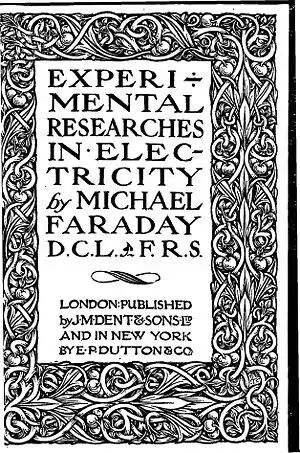| This work may need to be standardized using Wikisource's style guidelines. If you'd like to help, please review the help pages. |
| Titlepage to the 1849 second edition
In Two Volumes. Second Edition. Reprinted from the Philosophical Transactions of 1831-1838. London: Richard And John Edward Taylor, |
Titlepage to the 1869 edition
EVERYMAN'S LIBRARY

|

CONTENTS
I. § 1. Identity of Electricities from Different Sources1 i. Voltaic Electricity3 ii. Ordinary Electricity7 iii. Magneto-Electricity22 iv. Thermo-Electricity24 v. Animal Electricity24
- §2. Relation by Measure of Common and Voltaic Electricity
27 II. 3. New Law of Electric Conduction32 - 4. On Conducting Power Generally
41 III. 5. Electro-chemical Decomposition47 ¶ i. New Conditions of Electro-chemical Decomposition48 ¶ ii. Influence of Water in such Decomposition54 ¶ iii. Theory of Electro-chemical Decomposition55
IV. 6. Power of Platina, etc., to Induce Combination84 V. 5. Electro-chemical Decomposition- Continued (Nomenclature)111 iv. Some General Conditions of Electro-chemical Decomposition115 ¶ v. Volta-electrometer122 ¶ vi. Primary and Secondary Results133 ¶ vii. Definite Nature and Extent of Electro-chemical Forces145
- 7. Absolute Quantity of Electricity in the Molecules of Matter
163 VI. 8. Electricity of the Voltaic Pile172 ¶ i. Simple Voltaic Circles172 ¶ ii. Electrolytic Intensity203 ¶ iii. Associated Voltaic Circles; or Battery211 ¶ iv. Resistance of an Electrolyte to Decomposition218 ¶ v. General Remarks on the Active Battery226
VII. 9. On the Source of power in the Voltaic Pile232 ¶ i. Exciting Electrolytes being Good Conductors238 ¶ ii. Inactive Conducting Circles containing an Electrolyte241 ¶ iii. Active Circles containing Sulphuret of Potassium259
VIII. § 9.On the source of Power in the Voltaic Pile —Continued271 ¶ iv. The Exciting Chemical Force affected by Temperature271 ¶ v. The Exciting Chemical Force affected by Dilution.284 ¶ vi. Differences in the Order of the Metallic Elements of Voltaic Circles295 ¶ vii. Active Voltaic Circles and Batteries without Metallic Contact298 ¶ viii. Considerations of the Sufficiency of Chemical Action302 ¶ ix. Thermo-electric Evidence308 ¶ x. Improbable Nature of the Assumed Contact Force312
- On A Peculiar Voltaic Condition of Iron (Schoenbein)
317 - A Peculiar Voltaic Condition of Iron (Farady).
321,330 - Index
333
Contents
Series I.
§. 1.Induction of electric currents
§. 2.Evolution of electricity from magnetism
§. 3.New electrical state or condition of matter
§. 4.Explication of Arago's magnetic phenomena
Series II.
§. 5.Terrestrial magneto-electric induction
§.6.Force and direction of magneto-electricinduction generally
Series III.
§.7.Identity of electricities from different sources
i Voltaic electricity
ii Ordinary electricity
iii Magneto-electricity
iv Thermo-electricity
v Animal electricity
§. 8.Relation by measure of common and voltaic electricity
Note respecting Ampère's inductive results after
Series IV.
§. 9.New law of electric conduction
§. 10.On conducting power generally
Series V.
§.11.Electro-chemical decomposition
¶ 1. New conditions of electro-chemical decomposition
¶ 2. Influence of water in such decomposition
¶ 3. Theory of electro-chemical decomposition
Series VI.
§. 12.Power of platina, &c. to induce combination
Series VII.
§. 11.*Electro-chemical decomposition continued (nomenclature)
¶ 4. Some general conditions of Electro-chemical decomposition
¶ 5. Volta-electrometer
¶ 6. Primary and secondary results
¶ 7. Definite nature and extent of electro-chemical forces
Electro-chemical equivalents
§. 13.Absolute quantity of Electricity in the molecules of matter
Series VIII.
§. 14. **Electricity of the voltaic pile
¶ 1. Simple voltaic circles
¶ 2. Electrolytic intensity
¶ 3. Associated voltaic circles; or battery
¶ 4. Resistance of an electrolyte to decomposition
¶ 5. General remarks on the active battery
Series IX.
§. 15. **Induction of a current on itself
Inductive action of currents generally
Series X.
§. 16. Improved voltaic battery
§. 17. Practical results with the voltaic battery
Series XI.
§. 18. On static induction
¶ 1. Induction an action of contiguous particles
¶ 2. Absolute charge of matter
¶ 3. Electrometer and inductive apparatus
¶ 4. Induction in curved lines
Conduction by glass, lac, sulphur, &c.
¶ 5. Specific inductive capacity
¶ 6. General results as to the nature of induction
Differential inductometer
Series XII.
¶ 7. Conduction or conductive discharge
¶ 8. Electrolytic discharge
¶ 9. Disruptive discharge
Insulation
as spark
as brush
positive and negative
Series XIII.
as glow
dark
¶ 10. Convection; or carrying discharge
¶ 11. Relation of a vacuum to electrical phenomena
§. 19.Nature of the electric current
its transverse forces
Series XIV.
§. 20.Nature of the electric force or forces
§. 21.Relation of the electric and magnetic forces
§. 22.Note on electrical excitation